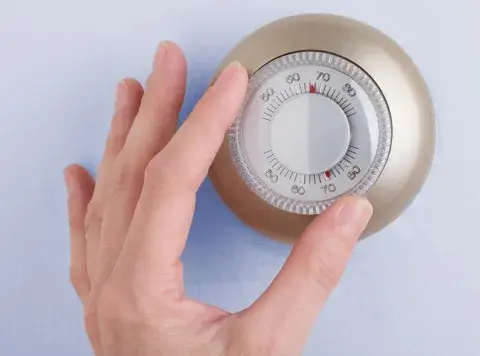
One common question NRRA staff get asked is “does my thermostat contain mercury?” Mercury thermostats are considered Universal Waste, meaning they contain a material that is hazardous. Universal wastes must be managed in a way that prevents chemical release into the environment, resulting in more strict regulation of these items. However digital thermostats, and many manual thermostats produced today do not contain mercury. These newer thermostats fall under the category of electronic waste and are subject to different regulations and are recycled using a different process.
Many thermostats in homes built prior to 2002 will contain mercury. These thermostats are typically operated by dials or switches, as well as other models of non-programable thermostats. The best way to identify mercury in a thermostat is by removing the front plate or cover and locating the small glass tube inside. If the tube contains a silver liquid with a bubble on top, this is a mercury thermostat. Mercury thermostats are safe to handle as long as the glass tube (commonly known as an ampule) remains intact.

Mercury containing thermostat ampule.
It is important to recycle these thermostats properly as mercury is a toxic substance and can be harmful to human health.
Laws and Regulations Pertaining to Mercury Thermostats
In all New England states, the sale of mercury thermostats is prohibited. Additionally, contractors hired in New England states are required to recycle any mercury thermostat they remove or replace. Disposal of mercury thermostats in solid waste is strictly prohibited across New England.
Where to Recycle Mercury Containing Thermostats
Established in 1998, Thermostat Recycling Corporation (TRC) has collected 2.4 million thermostats to date. This amounts to over 23,000 lbs. of mercury that has been safely collected and disposed of. In the year 2020, 15,918 thermostats have been collected in New England by TRC and 11,673 to date for 2021. Yearly reports for individual states are available on the TRC website.
TRC offers a searchable tool by zip code that will direct residents to the closest thermostat recycling drop off location. There are 3,400 nationwide drop-offs and all are at no cost to the resident. Please be aware that due to the Covid-19 pandemic some of these locations may be operating under a smaller window of hours or may have programs on hold. TRC suggests you call the location in advance to get the business hours for drop off.
Transfer stations are also welcome to order free collection bins from TRC that are available in one and five gallon sizes. Ordering for these bins is available on the TRC website as well as through email and phone. For more information on how to order a bin, check out NRRA’s info sheet on Mercury Thermostat Recycling.
For New Hampshire residents without a nearby collection site nearby, a pre-paid shipping label can be requested by phone or email. For more information about this option, check out the New Hampshire TRC webpage.
Where do Mercury Thermostats Go After TRC Collection?
TRC utilizes Veolia, an NRRA vendor, to process mercury containing thermostats! The thermostats are processed out of Wisconsin following regulated transportation, handling, storage, and environmental health standards by operators trained in Hazardous and Universal Wastes.
Have more questions about mercury containing thermostats or TRC’s recycling program? Please reach out to NRRA’s Member Services Team for more information. Recycle wise!
